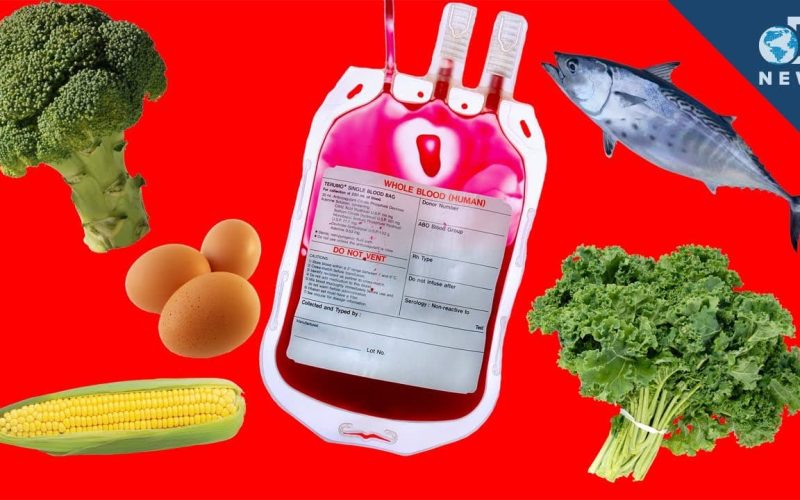Do you need to know more about the A blood type diet? You are in the right place.
Many people think the only time their blood type is relevant is when a blood transfusion occurs. However, recent discussions have pointed out that having a feeding plan for a particular blood type may offer some really good health benefits.
Diets that are based on blood type only came up recently, and have been greatly supported by doctors like the naturopath Peter J. D’Adamo.
However, there is not enough evidence to support or validate the health benefit claims that come with following A blood type diet.
Is was also concluded in the Journal of Clinical Nutrition that “No evidence currently exists to validate the purported health benefits of blood type diets.”
Regardless of this, people who are in support of the blood type diets believe that people can achieve a very healthy life and get a lower risk of exposure to disease when they eat specifically according to their blood type food requirements.
More studies are required, but in this series, we will discussing the importance of a person’s blood type, and the potential benefits that can be derived from feeding on the A blood type diet.
Quick facts you should know about the A positive (and A negative) blood type diet:
People who have the type A blood group may preferably follow a natural or vegetarian diet.
Individuals who have the type A blood have been discovered to possess lower levels of stomach-acid than people with other blood types. This would mean that a meat-based diet isn’t so good for them as such foods will not easily be digested like a natural or vegetarian based one.
Studies have revealed that some blood types are at a higher risk of developing some particular diseases or conditions.
Individuals with type A blood also possess a higher natural propensity for contracting or developing other diseases, like diabetes and cancer.
What exactly is the A blood type?
Blood is not just a red liquid that flows inside of us, it contains an array of cells that are required for the proper functioning of our bodies. These cells include plasma, platelets, as well as red and white blood cells.
Antigens are also a part of blood, and their function is to trigger a response by or immune system in event of an attack from foreign bodies or substances like viruses and bacteria.
It has been claimed that one out of every three people in the United States of America has an A positive blood type, and that makes it the second most common blood type in the nation.
This is great news because of someone in the United States needs a transfusion, the chances of getting a donor is pretty high.
When transfusion in needed by a person with A positive blood type, he or she can receive any of the blood types below:
- A positive
- A negative
- O positive
- O negative
While A positive is common, A negative is scarce. With an estimate of only 1 in 16 people having the A negative blood group, and restricted to only receive blood from A negative and O negative people.
Note that the common blood types differ in each county, so if you live outside the U.S. do not assume that you’re country has the same dominant blood grow. If you need a blood transfusion see to it that you check for the common blood types in your country.
Make sure that you make any necessary arrangements if you find yourself in a country with fewer A positive donors, like most countries in Asia, as you may find it difficult to receive the kind of treatment that you need.
Blood type and diet
It is believed that different blood types have varying reactions to specific foods. The A blood type diet is created to provide people with this blood group the right kind of benefits they should get from their food.
D’Adamo has argued that when blood comes in contact with some particular food components, there becomes chemical reaction, especially with the protein called lectin.
If you are wondering what lectins are, they are proteins that are found in food, and have been believed to cause a direct effect on the digestive tract and the blood.
These proteins called lectin, is known to bind to cells within the a person’s body, and it causes them to clump together and potentially create hormonal disruptions. Such a disruption will have a similar effect on the human body same way a foreign substance might.
Recommended foods for type A blood group diet
There are specific foods that are recommended for people who have the type A blood to eat, and there are foods they should also avoid, in order for them to maintain optimal health.
Per the blood group diet, below are the foods that people with type A blood group may benefit from:
Animal proteins
Although we have earlier pointed out that people with type A blood may be better suited to a natural or vegetarian diet, there are some animal products that are allowed, and they include;
- Turkey
- Chicken
According to the blood group diet, people who have the type A blood can consume most types of seafood and the most beneficial ones are;
- Cod
- Carp
- Grouper
- Monkfish
- Mackerel
- Red snapper
- Pickerel
- Salmon
- Rainbow trout
- Sea trout
- Sardine
- Snails
- Whitefish
- Silver or yellow perch
The specific exceptions are the ones on the “avoid list” of animal proteins that are written further down in this article.
Dairy
Digestion of dairy products is allegedly hard for individuals with the type A blood, however, some types of dairy products may be acceptable of consumption, such as;
- Kefir
- Yogurt
- Cheeses, including feta, mozzarella, goat, ricotta, cheese, and string
- Goat milk
- Cheese
Nuts and fats
Nuts are very important, and are also a great source of healthful fats and protein. People who choose to follow the type A blood diet plan can eat almost every nuts, apart form the ones that are listed in the “avoid” list below.
The most useful nuts for Individuals who follow the diet includes:
- Peanuts
- Walnuts
- Pumpkin seeds
For the most beneficial fats that people following the A blood type diet to eat includes olive oil and flax seed oil. Other fats that are allowable include cod liver oil and canola.
There is a selection of pumpkin seeds, peanuts, and even walnuts that you can purchase online.
Beans
According to the A blood type diet, beans are very well-tolerated by individuals with the type A blood, and the ones considered to be the most beneficial in this diet includes;
- Adzuki beans
- Grains
- Black-eyed peas
- Black and green beans
- Red soy
- Lentils
- Pinto beans
While most of the grains available for food are well-tolerated by those with the type A blood according to this diet, the ones that are considered the most beneficial may include the following:
- Buckwheat
- Amaranth
You can find a nice selection of buckwheat and amaranth available for purchase online. Allowable grains and breads include;
- Ezekiel, essene, sprouted wheat, and soya flour.
- Rice cakes
- Soba noodles
- Vegetables
- Oat, rice, and rye flour
- Artichoke pasta
Since vegetables are great for people with the A blood type, most vegetables may be well-suited to those who are following the diet. Some of the vegetables that are recommended include;
- Garlic
- Broccoli
- Onions
- Collard greens
- Carrots
- Pumpkin
- Kale
- Artichoke
- Spinach
- Horseradish
- Chicory
- Leek
- Greens, such as Swiss chard and dandelion
- Okra
- Parsley
- Tofu
- Romaine
- Tempeh
- Turnip
- Alfalfa sprouts
There are exceptions to the vegetable consumption rule, and the exception is listed below.
Fruits
Just like with vegetables, people with the type A blood group may be tolerant to most fruits. The fruits that are recommended for individuals who choose to follow the blood type diet includes those that are more alkalin, like the following:
- Figs
- Prunes
- Lemon
- Grapefruit
- Pineapples
- Apricots
- Plums
- Cherries
Most berries, such as blackberries, cranberries, boysenberries, and blueberries. Exceptions to the fruit rule are listed further down this article.
Recommended Spices and condiments
Spices and condiments are almost unavoidable, and the ones that people following this diet will alleged benefit from includes the following;
- Soy sauce
- Tamari
- Garlic
- Miso
- Blackstrap molasses
- Ginger
You can get a selection of tamari, soy, miso, sauce, ginger, garlic, and blackstrap molasses from the options available online.
Beverages
Beverages are very easy for anyone to conduit, but below are the beverages that are suited for the A blood type diet;
- Aloe
- Hawthorn
- Alfalfa
- Echinacea
- Burdock
- Red wine
- Green tea
- Coffee
- Slippery elm
- Ginger
Foods to avoid
Just as we have seen above, there are foods that are recommended for people with the A blood type. Listed below are a few of the foods that are to be avoided by the A blood group individuals for them to achieve optimum health.
Animal proteins
We listed the seafood that are allowed above, but Shellfish, such as shrimp, scallop, mussel, and oyster, must be avoided by the individuals following the blood type A diet.
This blood group diet recommends that people with A blood types should avoid consuming almost all animal meat products and some specific sea foods, such as;
- Beef
- Pork
- Veal
- Lamb
- Duck and goose
- Venison
- Barracuda
- Anchovy
- Bluegill bass
- Caviar
- Bluefish
- Beluga
- Catfish
- Crab
- Clam
- Flounder
- Gray sole
- Crayfish
- EEL
- Haddock
- Conch
- Frog
- Herring
- Lox
- Hake
- Halibut
- Octopus
- Lobster
- Oysters
- Mussels
- Shrimp
- Tilefish
- Scallop
- Shad
- Striped bass
- Squid
- Dairy
- Turtle
The blood type diet suggests that people in the A blood type group, should totally avoid any dairy products, and that includes all types of cheeses and milk that are not on the allowed list.
Nuts and fats
Some nuts and fats are to be avoided by individuals who chose to Follow this diet, including:
- Cashews
- Brazil nuts
- Pistachios
- Corn
- Cottonseed
- Peanut
- Safflower
- Sesame oils
Beans
Even though beans seem to be typically well-tolerated according to the blood group diet for A blood type, there are some beans that should be avoided, and they include;
- Garbanzo
- Copper
- Lima
- Tamarind
- Navy
- Kidney
- Red
Grains
While this diet suggests that most grains can be well-tolerated by individuals with type A blood, there are some grains that the diet suggests should be avoided, these include;
- Farina
- Familia
- Grape nuts
- Granola
- Cream of wheat
- Seven grain
- Wheat germ
- Durum wheat
- Shredded wheat
- Wheat bran
Breads that should be avoided on the diet include;
- English muffins
- High-protein whole wheat bread
- Multi-grain breads
- Pumpernickel
- Matzos
- White and wholewheat flour
- Wheat bran muffins
- Pastas, including spinach and semolina
Vegetables
Even though many vegetables are believed to be well-tolerated by individuals with type A blood according to the blood group diet, it is recommended that the following vegetables should be avoided;
- Olives
- Peppers
- Sweet potatoes
- Potatoes
- Cabbages
- Yams
- Lima beans
- Tomatoes
- Mushrooms
- Eggplant
Fruits
According to this diet, individuals with the type A blood can typically tolerate a variety of fruits very well, but the potential exceptions includes;
- Melons, like honeydew and cantaloupe
- Tangerines
- Oranges
- Rhubarb
- Strawberries and blackberries
- Papaya
- Mango
- Coconut
- Bananas
Spices and condiments
The Spices and condiments that must be avoided are not so many, and they include;
- Wintergreen
- Peppers, such as black, cayenne, and white
- Capers
- Vinegar
- Plain gelatin
- Mayonnaise
- Ketchup
- Relish
- Pickles
- Beverages
- Worcestershire sauce
Beverages may seem to be needed by almost everyone, but the diet recommends that the following be avoided;
- Beer
- Soda
- Black tea
- Seltzer water
- Distilled liquor
The conclusion
Whilst in recent years the blood type diet has been able to gain popularity, it is vital to have it in mind that there is still a lack of scientific evidence to support its claimed benefits.
There is yet to be any rigorous scientific study that is focused on the blood-type diet, as stated by Dr. D’Adamo himself, apart from a 2014 PLoS ONE research that came up with the conclusion, “the findings do not support the blood-type diet hypothesis.”
While the whole idea behind this feeding plan may be really nice when you think about it, it is best that just as with any diet or exercise program you choose to opt for, speak with a doctor first before you start a diet for your blood type.
Leave a comment below to get us know what you think.








